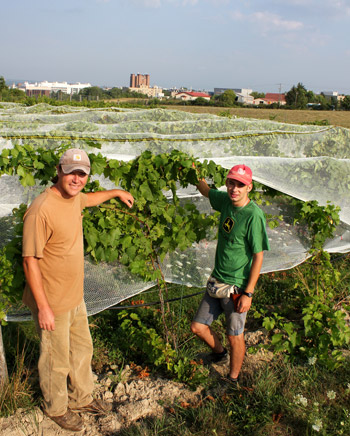Student-run vineyard is certified organic
By Craig Cramer

A block of about 500 grapevines at Cornell Orchards -- a little more than half an acre -- is now certified organic by the Northeast Organic Farming Association of New York Certified Organic, LLC.
"Virtually all of the management, from planning and planting to harvest and winemaking -- even the paperwork -- is done by students," says Justine Vanden Heuvel, assistant professor of horticulture.
The planting grew out of the two-semester course Sustainable and Organic Grape and Wine Production (HORT/FDSC/VIEN 3120/4120). "We started the course in 2010 because viticulture and enology students told us that they wanted to focus specifically on sustainability issues," says Vanden Heuvel. "That's something you can't just learn in the classroom. You have to go out in the vineyard and do it.
"To our knowledge, we are the only university in the country with a student-run organic vineyard or a course devoted entirely to organic viticulture," she adds.
During the spring semester, students develop a management plan for the season, from improving soil health to coping with weeds, pests and diseases. All the practices must comply with U.S. Department of Agriculture organic standards. The students prune and tie vines to the trellises, and one serves as an intern to carry out the plan through the summer.
Students planted the vineyard in 2010. Many of the vines are NY95, a new variety developed at Cornell that's particularly well-suited to organic vineyards due to its resistance to diseases such as downy and powdery mildews. Other varieties in the planting include such cold-hardy wine grapes as Frontenac gris, Marquette and Maréchal Foch.
The young vineyard will likely yield about a ton of grapes for its first harvest this fall. It should be in full production in 2014, when Vanden Heuvel estimates that it will yield 3 to 4 tons of grapes, or the equivalent of about 180 to 240 cases of wine. During the fall semester, Kathy Arnink, lecturer in food science, will take the lead in the class when students harvest the grapes and turn them into organic wine in the Teaching Winery at Cornell Orchards.
"When we're at full production, we'll probably use a quarter to half of the fruit in class and the rest we'll sell to home winemakers through Cornell Orchards," says Vanden Heuvel.
Intern Molly Smith '12 did the paperwork for organic certification as an independent study project in 2011. The process went smoothly, notes Vanden Heuvel, in part because the vines are surrounded on three sides by the Dilmun Hill Student Organic Farm, the MacDaniels Nutgrove and an idle field. Students added a temporary sudangrass buffer on the east side of the planting to separate the vineyard from other crops that are not managed organically until a pine tree planting on that side matures. They also planted the other three sides of the vineyard with flowers designed to attract beneficial insects to help control insect pests.
"Organic viticulture is growing quickly in the U.S., but it's really taken off in Europe," says Vanden Heuvel. "The organic vineyard and the course are really helping our graduates to go out into the world with real experience with these practices."
The Toward Sustainability Foundation has supported the start-up and ongoing management of the organic vineyard.
Craig Cramer is a communications specialist in horticulture.
Media Contact
Get Cornell news delivered right to your inbox.
Subscribe